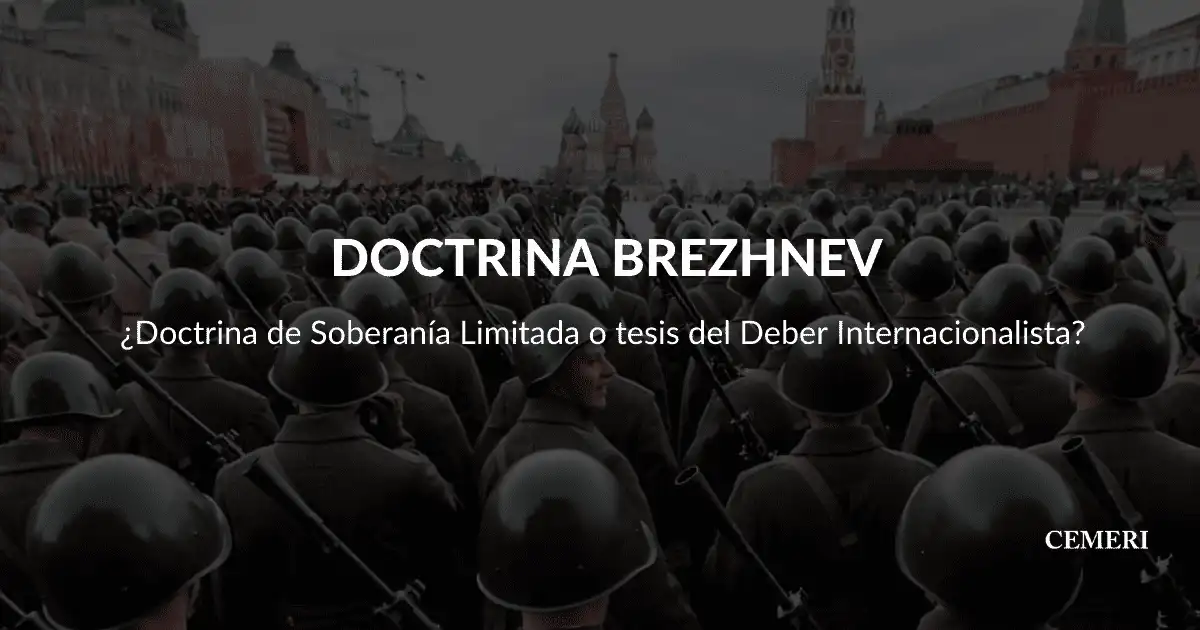Encyclopedia
Marco Antonio Olivera Eslava
Brezhnev Doctrine Doctrine of Limited Sovereignty or thesis of Internationalist Duty?
- The Brezhnev Doctrine or Limited Sovereignty Doctrine: term used by the United States and the Western media to define a policy outlined by Leonid Brezhnev.

The Brezhnev Doctrine or Limited Sovereignty Doctrine was a term used by the United States and the Western media to define a Soviet policy outlined in November 1968 by Leonid Brezhnev in which he affirmed the internationalist duty of the Soviet Union to defend and intervene in communist countries of the Eastern Bloc where socialist regimes were under threat in them.
After the Soviet invasion of Czechoslovakia during the Prague Spring, the Soviet leadership justified the use of force under what would become known as the Brezhnev Doctrine, which stated that Moscow had the right to intervene in any country where a communist government had been threatened. by hostile forces such as capitalism.
The Prague Spring was a period of liberal reforms instituted in Czechoslovakia, one of the Soviet bloc's satellite states, by the newly installed Alexander Dubček in 1968. The economic and political liberations were seen as a counterrevolution by officials in Moscow and at a meeting of the Warsaw Pact of August 3, Brezhnev stated that all socialist countries had a duty to support and defend socialist gains. Less than three weeks later, on August 20, Soviet forces invaded Czechoslovakia, and hardliners finally returned to power; Dubček was later deposed.
Origins of the Brezhnev Doctrine or Limited Sovereignty
The roots of the Brezhnev doctrine begin with Lenin. During the Russian Civil War, the fledgling Soviet of People's Commissars issued a proclamation entitled The socialist fatherland is in danger! After an introductory paragraph affirming the “sacred duty” of the workers and peasants of Russia to defend the Republic of Soviets “against the hordes of bourgeois-imperialist Germany”, the Council of People's Commissars lists eight conditions. The two most pertinent to the Cold War period state:
- All the forces and all the resources of the country are placed completely at the service of the revolutionary defense.
- All Soviets and revolutionary organizations are obliged to defend each position to the last drop of blood.
Language referring to the great Socialist Fatherland as a term in Soviet military policy came into use at the 21st Party Congress in 1959. Similar language would later be codified in the 1977 Soviet constitution.
The constitution adopted on October 7 in the year 1977, also known as the Brezhnev constitution, establishes that “The defense of the Socialist Fatherland is one of the most important functions of the State, and it is the business of all the people… The duty of the Armed Forces Forces of the USSR to the people is to provide a reliable defense of the Socialist Motherland and to be in constant combat readiness, ensuring that any aggressor is instantly repelled."
The intentional vagueness of this statement implies that the Soviet Union was ready to wage nuclear or conventional war to protect Eastern Europe. Whether it extended beyond the border of its Warsaw Pact allies is unclear, but it set a precedent for invading these allies to provide military support for their communist party-led governments.
Like the Monroe Doctrine of the United States, which was used to justify intervention in Latin America to protect its interests in this region of the world, the Brezhnev doctrine was intended to fulfill an internationalist duty.
Formation of the Warsaw Pact by the Soviet Union
On the other hand, when the Soviet Union fought Nazi Germany in Eastern Europe, the Soviets did not liberate countries, like Poland, that were in the way, but instead became part of the Union. Other countries went on to have communist regimes and joined the Warsaw Pact, a military alliance to counter NATO.
As the 1940s, 1950s and 1960s passed, a new generation of politicians took over, with new ideas, and slowly the Eastern Bloc (the great Socialist Homeland) began to go in different directions; for a brief time it seemed that these countries adopted a different and distant character from the ideology of the Soviets.
The Prague Spring
The coming to power in Czechoslovakia of Alexander Dubcek brought with it a partial decentralization of the economy, democratic opening, a loosening of restrictions on the media, greater freedom of expression and movement. It was these actions that allowed for further public debate throughout Czechoslovak society about communism.
The Soviet Union did not approve of this and decided to invade Prague. The population took to the streets to demonstrate peacefully demanding a free Czechoslovakia, but Moscow, fearing that this type of movement would spread even more in other Bloc countries, decided to use force and reinstall a more conservative communist government. Soviet forces faced minimal opposition as they advanced through Czechoslovakia, quickly seizing control of the major cities. Before long, the Soviets forced Dubcek to resign and imposed a strict form of communism and ended the short-lived freedom of the press.
Brezhnev justified the invasion of Czechoslovakia in a speech with the following words that describe the Brezhnev Doctrine:
“The peoples of the socialist countries and of the communist parties certainly have and should have the freedom to determine the paths of advancement of their respective countries.
However, none of your decisions should harm either socialism in your country or the fundamental interests of other socialist countries, and of the entire movement of the working class, which is working for socialism.
This means that each communist party is responsible not only to its own people, but also to all socialist countries, to the entire communist movement. Whoever forgets this, by emphasizing only the independence of the communist party, becomes one-sided. It deviates from its international duty.
[...]
Fulfilling their internationalist duty towards the brotherly peoples of Czechoslovakia and defending their own socialist achievements, the USSR and the other socialist states had to act decisively and acted against the anti-socialist forces in Czechoslovakia."
Consequences
After the Soviet invasion of Czechoslovakia in August 1968, Moscow began promoting the notion of "limited sovereignty," soon dubbed by Washington as the "Brezhnev Doctrine."
After the Prague Spring was neutralized, the Eastern Bloc was under explicit threat of Soviet attack, keeping a check on Eastern Bloc affairs.
The thesis of ''internationalist duty'' also became the main justification for the Soviet invasion of Afghanistan in 1979, and even before that it triggered the crisis in Sino-Soviet relations, as Beijing feared that the Soviet Union use doctrine or duty as a justification for invading or interfering with Chinese communism.
After Brezhnev's death in 1982, his doctrine remained in force until Mikhail Gorbachev became leader of the USSR in 1985. Faced with a changing political climate, Gorbachev abandoned the Brezhnev Doctrine. In 1988 he withdrew Soviet troops from Afghanistan, and that same year he refused to intervene as a wave of democratization swept across Eastern Europe.
Sources
N/A

